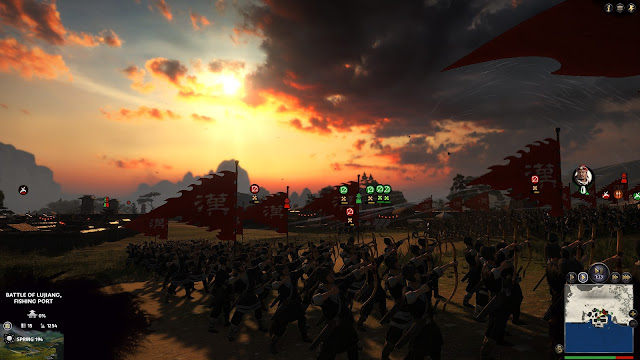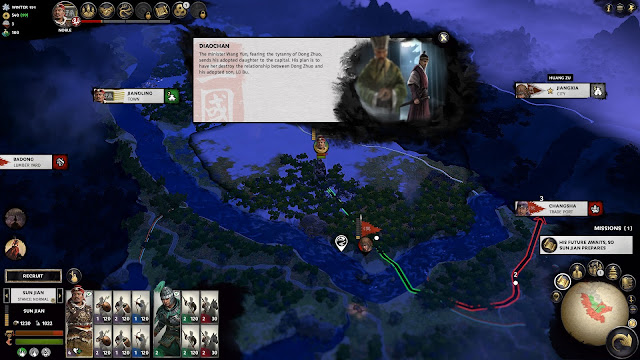Review by Matt S.
It surprises me that it has taken the talented group at Creative Assembly so long to take a swing at bringing its Total War formula to the ancient conflict depicted in Romance of the Three Kingdoms. As a conflict that spread across the entirety of China, and brought together so many notable leaders, battles, and so much political and social intrigue, it’s one of the eras of military warfare that I would have assumed would be a natural and instant attraction to anyone working on Total War. But not to worry. We have it now, and it has delivered on every level.
I’m not going to get into specific systems and tweaks of this Total War in comparison to what has come before. There’s too much going on under the hood to discuss at detail in a review. What’s important to know is that the base game hasn’t really deviated from the popular formula that Creative Assembly has been fine tuning for close to two decades now. If you have played one of these before, then Three Kingdoms is going to be instantly familiar and accessible. If you’ve never played one, what you need to know is that Total War is a true merging of two very distinct strategy genres. One is the grand strategy, where, just like as in Civilization or Europa Universalis, you concentrate on developing up your nation. You improve cities, build economies, and engage in diplomacy with those around you. You also raise up armies, which you’ll use to participate in the second half of the Total War experience: The battlefields where, in real-time fashion, you command units to move, attack, flank and retreat.
There is a lot to manage in this game as a result, and initially Total War titles can feel overwhelming to new players. Unfortunately for Total War: Three Kingdoms, the changes that have been made from previous titles make it even less accessible for the newcomer. The diplomacy system is even deeper and more demanding. You now need to manage the relationships between your own nation’s generals, and make sure that only those that get along command armies side-by-side. You’ll need to build spy networks, and before you even start playing, you’re going to need to make a critical decision: do you want to play a more “historically authentic” mode, or do you want the fantasy of the Romance mode?
See, Romance of the Three Kingdoms is a historical novel in the truest sense. As far as we can tell (given the general unreliability of records from back in those days), the book treats with the basic historical reality, but as a novel it’s much more interested in elevating the drama and excitement of what happened. In other words, in Romance of the Three Kingdoms, the generals of various armies and nations are effectively like a bunch of Marvel heroes – all capable of wiping out entire units single handedly, and the really interesting battles are the one-on-one duels between these monumental men. The Dynasty Warriors series by Koei Tecmo, often derided for the way it treats with history, is actually closer to the tone of the book than many who haven’t read the book would assume.
Total War: Three Kingdoms allows for some of this fiction, as generals can issue challenges to one another to engage in single combat, and, with Romance mode turned on, have access to truly superhuman abilities. It’s quite brilliant work by the development team to find a way to make the visceral action that the book depicts into something that complements, rather than takes away from, the rest of the cerebral strategic action of Total War.
The game isn’t perfect; I found the diplomacy system irritating, because rival (and/or friendly) warlords will constantly spam you with ridiculous offers that you were never going to want to consider, much less negotiate, and this system really drags the pace down between your own turns. My local Dominos pizza restaurant spams my mobile phone with fewer “special offers” via SMS, and that company really presses against my patience, in terms of both offering useless “deals” and the frequency with which they come in. In a way, it’s impressive that this game’s diplomacy system reminded me of that SMS spam.
I also find the on-field action to be a little too fast for comfort. I’ve always been more drawn to the grand strategy that the battlefield tactics, and thankfully it’s possible to delegate the field battles to the AI if you want to. On the other hand, the AI will only ever generate the expected result, and in most cases you’ll be able to do better yourself, so I found myself constantly drawn into battle anyway, unless there were such overwhelming odds, one way or the other, that there was simply no point to bother. While I appreciate that the actual battlefields back then were a chaotic mess, I’ve always found Total War to be a little too frantic for me to feel like I was being rewarded for good field tactics.
These are the most minor of quibbles, though, and don’t affect the overall standard of the game which is, two decades after the first Total War, supremely balanced and elegantly executed. Once you move through the initial sense of being overwhelmed, the most wonderful strategy playground opens up to you, allowing you to focus on cavalry or ranged, melee or siege warfare as you prefer. There’s no “wrong” strategy, but rather a chance to personalise forces and then learn how to best use them on the battlefield. As someone who does enjoy building forces around ranged combat and defensive play I have developed substantially different strategies to more aggressive players, but it’s possible to win from either of those extreme ideologies, or anything else in-between. It’s a rare strategy game indeed that is so open-ended in how it allows you to approach success.
As to be expected from Total War, the presentation really helps to set the scene, and Three Kingdoms is a gorgeous rendering of China. Unlike Koei Tecmo’s rival Romance of the Three Kingdoms series, portraits and the environments are quite natural and realistic in tone – no wild-looking Lu Bu here – and it’s exactly how I would have imagined the battlefields of ancient China to look when I read Romance of the Three Kingdoms. The variety of units is impressive (though lacking the fantastic brilliance of the Warhammer Total War titles), and the siege battles are the most visually impressive because damn those castle towns look elegant and exotic.
The game also does a great job of distilling a 2,000-odd page book down to a narrative that’s palatable to a player who hasn’t read the book before. Short cut scenes and clearly-written event descriptions make it clear which warlord has betrayed who, and why one warlord has declared war on another. The Three Kingdoms era was a turbulent one, but focused around the stories of three “nations” that would come to dominate – the forces of Cao Cao, the Sun family, and Liu Bei. This game makes sure that you’re keenly aware of their movements, while the more fringe nobles and events can be left for when you’re more comfortable with the material. Already my favourite challenge is trying to actually succeed as the ultimate underdogs – the yellow turban rebellion. Talk about underequipped and up against a hostile diplomatic environment.
Within the game’s systems the historical relationships between warlords is carefully structured. Naturally, it’s possible to change the course of history, if you’re so inclined, but the game’s narrative engine always works hard to push things in the right direction. I don’t think that Total War: Three Kingdoms holds the educational value that Romance of the Three Kingdoms does, but it’s not far behind, and the more rich, refined gameplay will (I hope), encourage people previously unfamiliar with the era and book to learn a little more about it all.
While the basic formula to Total War hasn’t changed, Creative Assembly is genuinely impressive in the way that it manages to capture the subtleties of warfare in whatever era its depicting. Rome played and felt differently to Napoleon, and the Total War titles set in Japan (Shogun) feel completely different to this one. Most impressively of all, Creative Assembly had such respect for the base material that not only did the team go to the effort to try and separate historical fact and fiction, when the principle text that we have on the era is a novel… but they also then threw all the romantic heroism in there as well. On top of that, regardless of which way you choose to play, you get a supremely balanced, intelligent, and deeply strategic game in Total War: Three Kingdoms.
– Matt S.
Editor-in-Chief
Find me on Twitter: @digitallydownld
Please help keep DDNet running: Running an online publication isn’t cheap, and it’s highly time consuming. Please help me keep the site running and providing interviews, reviews, and features like this by supporting me on Patreon. Even $1/ month would be a hugely appreciated vote of confidence in the kind of work we’re doing. Please click here to be taken to my Patreon, and thank you for reading and your support!











